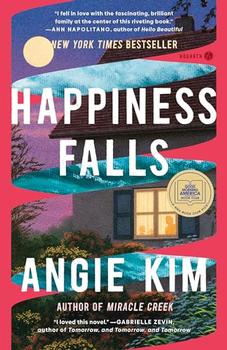Summary | Excerpt | Reading Guide | Reviews | Beyond the Book | Readalikes | Genres & Themes | Author Bio

A Novel
by Angie KimOne
Locke, Bach, and K-pop
We didn't call the police right away. Later, I would blame myself, wonder if things might have turned out differently if I hadn't shrugged it off, insisting Dad wasn't missing missing but just delayed, probably still in the woods looking for Eugene, thinking he'd run off somewhere. Mom says it wasn't my fault, that I was merely being optimistic, but I know better. I don't believe in optimism. I believe there's a fine line (if any) between optimism and willful idiocy, so I try to avoid optimism altogether, lest I fall over the line mistakenly.
My twin brother, John, keeps trying to make me feel better, too, saying we couldn't have known something was wrong because it was such a typical morning, which is an asinine thing to say because why would you assume things can't go wrong simply because they haven't yet? Life isn't geometry; terrible, life-changing moments don't happen predictably, at the bottom of a linear slope. Tragedies and accidents are tragic and accidental precisely because of their unexpectedness. Besides, labeling anything about our family "typical"—I just have to shake my head. I'm not even thinking about the typical-adjacent stuff like John's and my boy-girl twin thing, our biracial mix (Korean and white), untraditional parental gender roles (working mom, stay-at-home dad), or different last names (Parson for Dad + Park for Mom = the mashed-up Parkson for us kids)—not common, certainly, but hardly shocking in our area these days. Where we're indubitably, inherently atypical is with my little brother Eugene's dual diagnosis: autism and a rare genetic disorder called mosaic Angelman syndrome (AS), which means he can't talk, has motor difficulties, and—this is what fascinates many people who've never heard of AS—has an unusually happy demeanor with frequent smiles and laughter.
Sorry, I'm getting sidetracked. It's one of my biggest faults and something I'm trying to work on. (To be honest, I don't like shutting it down entirely because sometimes, those tangents can end up being important and/or fun. For example, my honors thesis, Philosophy of Music and Algorithmic Programming: Locke, Bach, and K-pop vs. Prokofiev, Sartre, and Jazz Rap, grew from a footnote in my original proposal. Also, I can't help it; it's the way my mind works. So here's a compromise: I'll put my side points in footnotes. If you love fun little detours like Dad and me, you can read them. If you find footnotes annoying (like John) or want to know what happened ASAP (like Mom), you can skip them. If you're undecided, you can try a few, mix and match.)
So, anyway, I was talking about the police. The fact is, I knew something was wrong. We all did. We didn't want to call the police because we didn't want to say it out loud, much the same way I'm going around and around now, fixating on this peripheral issue of calling the police instead of just saying what happened.
Here goes: my fifty-year-old father, Adam Parson, is missing. At 9:30 a.m. on Tuesday, June 23, 2020, he and my fourteen-year-old brother Eugene hiked to the nearby River Falls Park, the same as they had done most mornings since I'd been home from college for the quarantine. We know they made it to the park; witnesses have come forward, a dozen hikers and dog-walkers who saw them together at various points around the waterfall trail as late as 11:10 a.m. At 11:38 a.m. (we know the exact time from the dashcam recording), Eugene was out of the woods, running in the middle of a narrow country road in our neighborhood, forcing a driver who'd run through a stop sign and turned too fast to swerve into a ditch to avoid hitting him. Just before the dashcam video jolts from the crash, you can see a fuzzy Eugene, not stopping, not turning, not even looking at the car or at anything else—just stumbling a little, so close to the car you'd swear he got hit. The screech of the tires and the sound of the car thudding into the ditch, not to mention the chain reaction of the two cars behind it, apparently caused a terrible cacophony of metallic crunching, banging, and squealing that brought people out, and bystanders reported seeing a boy they later identified as Eugene staggering away. It bears note that not one of the five bystanders, three drivers, or two passengers involved in the crash saw my father precede, follow, or accompany Eugene. We confirmed this multiple times, and it is beyond dispute: Eugene was in our neighborhood alone.
Excerpted from Happiness Falls (Good Morning America Book Club) by Angie Kim. Copyright © 2023 by Angie Kim. All rights reserved. No part of this excerpt may be reproduced or reprinted without permission in writing from the publisher.
Your guide toexceptional books
BookBrowse seeks out and recommends the best in contemporary fiction and nonfiction—books that not only engage and entertain but also deepen our understanding of ourselves and the world around us.